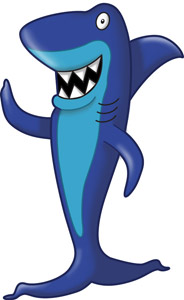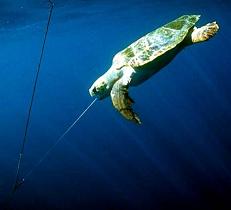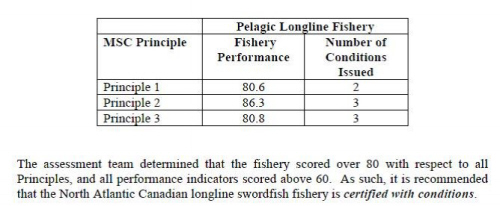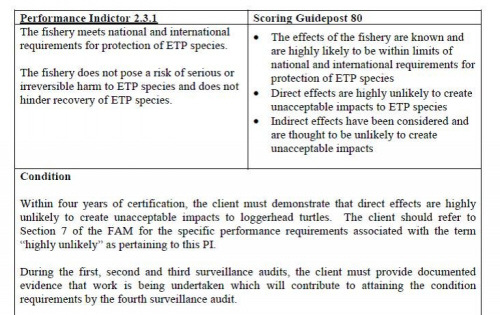
 In a world where greenwashing, overfishing, bycatch and pirate fishing run rampant, it can be difficult for eco-conscious consumers to know what to buy. Many eco-certification agencies exist, but they often offer conflicting advice. Who should you listen to?
In a world where greenwashing, overfishing, bycatch and pirate fishing run rampant, it can be difficult for eco-conscious consumers to know what to buy. Many eco-certification agencies exist, but they often offer conflicting advice. Who should you listen to?
I am often asked that question when I give public lectures, and I’ve never hesitated to recommend the Marine Stewardship Council. They are the largest, most trusted authority in determining which seafood is sustainable. Additionally, they work closely with scientists and conservation groups.
The Marine Stewardship Council is in the process of evaluating several fisheries to decide whether or not they will be earn the “sustainable” label. One of these, the swordfish longline fishery on Canada’s Atlantic coast, has just been recommended for sustainable status by Moody Marine (a MSC certifying agency). The Canadian conservation group “Friends of Hector” (Twitter) strongly objects to this recommendation.

Friends of Hector claims that the bycatch in this fishery, particularly shark and sea turtle bycatch, is a major problem:
“Sharks are extremely important to our marine ecosystems and they are in trouble. Compared to the 1960s, most species have only 10 – 20 % of their populations left. Sea turtle populations have declined by as much as 75% over the last 20 years. Globally, surface longline fishing is one of the main causes of catastrophic declines in the populations of the oceans’ large predators and sea turtles.
Canada’s surface longline fleet is no exception. Every year, it is estimated that 50 – 60% of what the Atlantic Canadian surface longline fleet catches is unwanted and thrown back, including:
- 100 000 sharks.
- Blue shark
Status: near threatened- Short-fin Mako
Status: vulnerable- Porbeagle
Status: vulnerable- 1200 Loggerhead sea turtles
Status: endangered- 170 Leatherback sea turtles
Status: critically endangered”
In other words, approximately 100,000 IUCN Red Listed animals are caught as bycatch when fishermen catch approximately 20,000 swordfish each year. Pardon the pun, but something sounds a little fishy to me – how can a fishery with such devastating bycatch be considered sustainable by the world’s leading authority on such matters?

The recommendation from Moody Marine explains their reasoning:
… huh? In case you’re unfamiliar with the process, let’s summarize how a fishery is certified as sustainable.
“In 2008 the MSC implemented the use of a default assessment tree which included defined Performance Indicators and Scoring Guideposts (PISGs)…all fisheries entering full assessment are to be assessed using the default PISGs
Within the default assessment tree there are 31 performance indicators…Individual ‘Scoring Guideposts’ (60, 80 and 100) are identified for each performance indicator. It is at this level that the performance of the fishery is measured…A performance score of at least 60 but less than 80 is intended to reflect ‘a pass with condition’, a score of 80 but less than 100 represents ‘pass without condition’, while a 100 score reflects ‘perfect performance.
In order for a fishery to be certified it must accomplish three things:
1)Achieve a score of 60 or greater for all 31 performance indicators;
2) Each MSC Principle must achieve an aggregated score of 80, or pass without conditions.
3) A contractual commitment to improve performance for each indicator that has a score less than 80 (i.e. certification condition)”
The Canadian Atlantic longline swordfish fishery was certified with conditions , which means that Moody acknowledged that although their practices meet an objective minimum score, their practices aren’t perfect. You can read the full report here (warning, it’s over 200 pages). The bycatch numbers in the Moody report more or less agree with those supplied by Friends of Hector. The swordfish fishery’s plan for addressing this bycatch is where the problem lies:
A letter to MSC, co-signed by Friends of Hector and numerous other environmental groups, explains this concern:
To define ‘ETP (Endangered-Threatened-Protected) species’ the MSC does not recognize listing by COSEWIC, Canada’s government science advisory body for species at risk, or the IUCN ETP status reports. Shark species are not assessed under MSC’s ETP criteria. Unfortunately, even for the endangered sea turtle species scored under the ETP criteria, the assessment falls short. The MSC’s minimum passing grade requires that “the fishery does not pose a risk of serious or irreversible harm to ETP species and does not hinder recovery of ETP species.” This fishery has no enforceable management measures in place to minimize catch of sea turtles:
• no bycatch limits
• no bait or soak time restrictions
• no spatial/temporal closures
• insufficient hook restrictions (16/0 circle hooks do not reduce the loggerhead catch rate)
• only 5%, biased observer coverage to monitor numbers, condition, and handling of turtles
The certification scoring does not mandate any of the above be implemented.
Friends of Hector for not only criticizes the existing plan, but provides a reasonable alternative. Here is what they suggest:
“Are there ways to make this fishery less harmful to the marine environment?
Yes, groups in Canada and around the world are asking for the following conservation measures to be put in place:
- Scientifically based limits on the amount of each bycatch animal that can be caught. Once the fishery reaches this catch limit it would be closed for the season
- Human or video observers on every fishing trip to enforce limits and to get a better idea of all the marine animals that are being caught
- Work with fishermen to develop of gear modification and strategies to help avoid catching non-target animals
- More incentives for swordfish to be fished by harpoon instead of longline
Is there another way to fish for swordfish?
Yes. Nova Scotia, Canada has one of the last remaining traditional harpoon fishing fleets in the world. Harpooning for swordfish is a very selective way of fishing with no bycatch. You can support this fleet by asking for harpooned swordfish at your local seafood restaurant or supermarket.”
Based on the information in the Moody report and the Friends of Hector campaign, I do not believe that the Canadian Atlantic longline swordfish fishery should be considered sustainable. The bycatch of threatened and endangered species is just too high. I have sent a letter to the MSC expressing my concerns. You can do the same by clicking here.




This is where a number of issues with MSC certification keep coming up. Moody is the dominant assessment agent for MSC right now (in and of itself an issue) and as a rule they do not seem to evaluate Principle 2 anywhere near as precautionary as I would have them do. Based on their report (not knowing anything about this fishery) I would not have been able to justify such high scores for Principle 2. Of course almost every Moody report I look at, especially those with bottom contact gear, I have to say that.
HERE IS A VIDEO I MADE ABOUT THE PROBLEM THAT HAS GROWING ALMOST BEYOND OUR CONTROL.
WATCH THIS PLEASE
I’M LOOKING FOR HUMANITY -HOW ABOUT YOU?
http://www.youtube.com/watch?v=1ZSxeRwvPSs
Agree with you 100% in terms of the certification process. To be fair however, the industry is trying to reduce by-catch with changes in gear and is willing to work with researchers to eliminate bycatch. They have quick release gear on board to quickly release animals and have the capacity to release sharks without bringing them out of the water. The fishers would just as soon not have to worry about sharks at all due to time and every shark on the line, means a swordfish not there! Also, I believe they will be attempting to try some smart hooks that will repel sharks and see how that works.
Another point to raise is that mortality estimates seem to differ between the industry and DFO, less than 15% and more than 30% respectively. Most sharks are released and likely due survive and the industry does have a license to retain shark species also, so some are retained.
Anyway, off topic a bit but at present, I agree that the industry as it is, should not be certified.
Despite the inability to use a shift key and the complete lack of context, the above comment in not generic spam.
Thank you for laying this out so clearly. It’s important to note, again, that the MSC doesn’t do the certifying or determine whether the fishery is listed as sustainable – it’s all done through a third-party certifier, which in this case is Moody Marine.
The certifiers use MSC guidelines in conducting the assessment, but the goal here shouldn’t be so much a question of asking the MSC not to certify the fishery as sustainable as it should be asking them to look at their guidelines as a whole, to ensure that things like this (fisheries getting ‘passing grades’ despite huge issues) don’t happen.
From my understanding, they can’t really step in and say “nope, we’re not going to certify this fishery, despite it meeting our criteria.” That wouldn’t be fair, and would kind of defeat the purpose of having this set criteria at all. What they need to do is overhaul their criteria for *all* assessments, to close the loopholes in this and future assessments.
Great presentation of the issues, David. Thanks!
No No No NO.
It is the the scientists who are ruining the native wildlife may they be in water or on land. Just because they carry the title Scientist does not mean that they are right. Most of the time they are not. These by catches are caught because of the deep net fishing. Which should not exist in the first place. These nets are taking everything in their way to a death trap.
By catch yes, if man wouldn`t be so greedy and money hungry the sharks might have some food left instead of attacking humans.
I say no to the by catches if they are still alive they ought to be thrown back into the ocean. Especially animals that have a long lifespan as they do breed in their later years because of their slow maturity.
It is a slow and agonizing death to drown ion these nets. Shame on the Scientist the Good-doers killing innocent animals that ought not being caught in the first place.
Shame on the people supporting the by catch animals for consumption…
If you keep fishing every life out of the ocean there wont be any life left`. It would destroy the ecosystem underwater but you Scientists etc. know that already don`t you.
Shame on you all supporting this …
Yeah, those damn scientists keep figuring out how human actions negatively impact the environment! They should just stop so we can live in ignorance while the world burns around us!
Say what?
I’m very happy to see this issue receiving the attention it deserves. The pending certification of this fishery is a matter of grave concern as it highlights the weaknesses of the MSC process. I won’t dwell on them ad naseum but I do want to highlight that “certification with conditions” has been a major stumbling block to any sort of dependability of this logo since its inception. Not only are these fisheries being certified as “sustainable” before they actually are (even according to the MSC, it would seem), but there are numerous examples of fisheries that have not met their conditions at re-certification and yet have not lost their certified status.
It’s also important to note that since the MSC system is a binary certification at point-of-sale (either something is certified or its not), the worst fishery brings down all the rest. The certification of the longline swordfish fishery will virtually eliminate all the advantages of the harpoon fishery, as the two products will appear identical on wetcase ice once the MSC checkmark has been appended to both of them (and yes, there’s a different ID number, but honestly, how many customers are actually going to research those numbers while buying Friday dinner at the grocery store?)
Is there not also a tremendous “bycatch” of several albatross species as well?